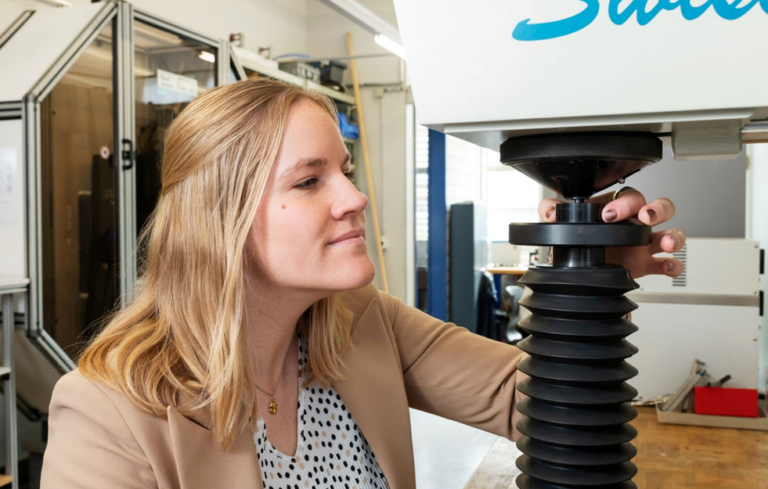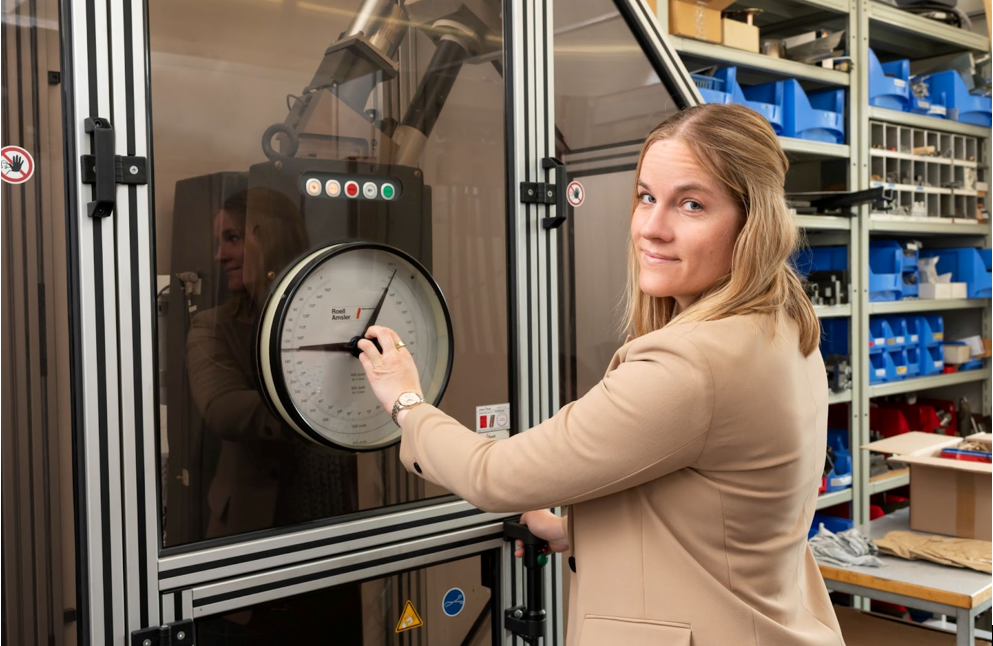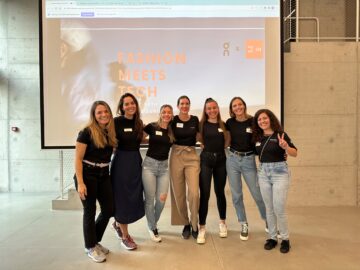Each month we have the honor of interviewing Women Who Inspire Us. This month we talked to Priska Herzog. Priska is the youngest and the first female lecturer in mechanical engineering at the Hochschule Luzern. In this interview, we talk about how she found her own path to succeed in this male-dominated industry and how much influence allies and supporters can have on you.
Priska, tell us a bit about yourself, your background, and your current position.
I am Priska, a lecturer at the Department of Mechanical Engineering at the Hochschule Luzern. Originally I am from Fribourg, where I have also studied mechanical engineering in my Bachelor’s degree. Then I went to Sweden to do my Master’s Degree in Product Development. I have worked both in research and in industrial product development, and today I am a lecturer and researcher. I teach courses in Material Science and Mechanics at the Bachelor’s level and conduct research in sustainable materials.
What brought you into the tech industry in the first place?
Funnily, my main subject at high school was arts. I have always been a very creative person and I’ve always loved to work with my hands. But I also realized that art is not what I wanted to do for work. My brother – he already studied mechanical engineering – then suggested that I should be an engineer because he saw how good I was at creating and fixing things and that I was very strong in all MINT subjects at high school. I really liked the idea because as an engineer you can develop things and be creative in a more logical and quantifiable way than if you do art pieces where you’re never really sure about the outcome.
Also, when I understood how wide the field of tech was, I was certain that there would always be a perfect place for me, no matter how much I changed. I love how my work can have a real impact on products – and creatively working in a team to develop a product or a prototype is so much fun.

“ My professors not only sparked my interest in various tech subjects but also motivated me to become a professor myself and help students find their own passion”
Can you tell us a bit more about your journey to becoming the youngest and first female lecturer in mechanical engineering at the Hochschule Luzern? Did you plan this career?
In my Bachelor’s, I had some lecturers who really had an impact on me with their motivation and passion to teach the subject and support the students in any matter. Because I am a person who enjoys social interaction a lot, I started to think about becoming a lecturer for my own career path. I knew for this I needed a Master’s Degree, so that was the next logical step. Also, I selected my jobs in such a way, that it gave me the most relevant working experience to be where I am today – this included jobs that challenged me and pushed me into different fields to gain more diverse experience.
So, yes. In a way, I did plan my career. It was very clear to me that I wanted to achieve my goal before having a family and working part-time, as the field is very competitive. Therefore, I had to have a plan on how I could get there in about 5 years. Nowadays, I haven’t strictly planned my whole career, but I know some things that I want to achieve in the next few years.
Also, along the way, there were things that I couldn’t foresee (such as an allergy to one of the products I was developing), so I have been flexible with adjusting my career plan to the circumstances.
Who’s been the most important influence on you during your journey?
My professors. When they were teaching, I could feel their passion for the subject and could imagine how this know-how would be applied in real life. These professors not only sparked my interest in various tech subjects but also motivated me to become a professor myself and help students find their own passion.
Also, my brother and my dad had an impact on me, as they both work in mechanical engineering as well.
What has been the toughest challenge you faced while working in tech? Did you ever find yourself in an unfair position? What did you learn from it?
The toughest challenge has been when people have a very strict view on role distribution between women and men and they wouldn’t even give you the chance to prove yourself. I’ve experienced this in the past where I was a project leader and one of my team colleagues wouldn’t accept me in this role and he made it about the gender. This was quite a tough situation but luckily, he changed his mind at some point and it worked out well.
My advice here is to not let it get to you. Try to do your best and focus on the people who are already on your side or whose minds you can influence. Be the best example that in today’s world, there are many different role allocations lived and all genders can do competent work no matter in what field. Don’t waste your whole energy on those not seeing this.
Also, talking to your teammate can help change the team setup so that it doesn’t influence the team’s work in case you deal with a difficult team situation as in my example above.
Why would you encourage others to work in tech?
In the tech industry, you can work on anything you want. If your interests change, so can your job. You can work with robots for some years and then switch over to bicycles if you wish. This keeps it extremely interesting and you have so many possibilities to learn and grow. There are not many domains where this is possible. Also in tech, you get to decide how a product looks like, what it can do, and see the impact your work had on the outcome.
What is your advice on individuals or the system to bring more women into the field of mechanical engineering and tech?
Luckily, the system at HSLU is already quite good. They found out that there are many women in research but not many in teaching. Thus, they changed the system so that it is easier to switch from research to becoming a lecturer and the results show that there are now many more women teaching at HSLU than before the system change.
For individuals, my advice is to do what you really want to do and not get discouraged by the low number of women. Find your own way and don’t think you have to prove yourself from the first minute on. All the other people in the room most likely also don’t know the answer to a question or problem, so try to enjoy the learning process together with your classmates and colleagues. Also, stick to the people supporting you. Don’t try to do it all alone. Even if you are the only woman in a place, there is always that one classmate or colleague who is your biggest fan just for being there. Talk to them about difficult situations, your fears, and your dreams. It is impressive how much this support can do, even if things aren’t always ideal.
There are more and more male allies who want you to succeed, who want you to be a role model for their daughter, their wife, their sister, etc. It doesn’t matter which gender your supporters have.

“Stick to the people supporting you. It doesn’t matter which gender they have. There are many allies who want you to succeed”
How do you think has digitization impacted your or women’s career opportunities?
With digitization, women’s networks have certainly become more prominent – you can simply connect with a community online and they are very visible on social networks. I believe that these networks, the career stories they share, and the visibility around women they create have a huge impact on today’s opportunities for women in tech. It’s more and more visible that there are many powerful and competent women in tech.
What is your next challenge and what are you hoping to achieve in the future?
My next challenge is to set up and lead my own research group working on sustainable materials. I would like to have enough research projects to earn my professorship title and still do a good job at teaching, all while starting a family. I think this will be the biggest challenge of my entire career, as until now everyone supposed my one and only goal in life was my career, which is far from the truth.
Despite following a very steep career path, I love my life not only for my work but also for my hobbies and all the people in my life, and I would like to spend more time with them. I get the impression that nowadays people understand that women are made for steep careers as well. But women successfully combining a career with a family by working part-time and still performing in their career is still perceived as impossible sometimes. This is hard if you have to prove yourself more than you had to before, just because you have a family at home now.
If it’s possible for a man, why should it not be possible for a woman?
Thank you Priska for being a woman who inspires us! 💛
Author: Corinne Ruckstuhl






